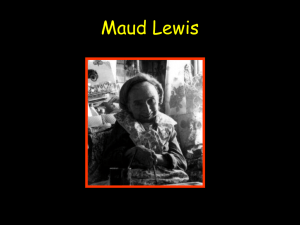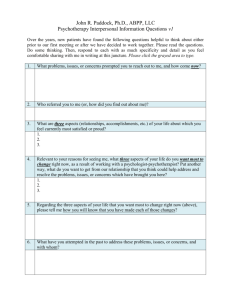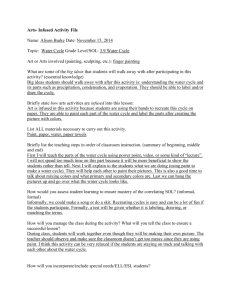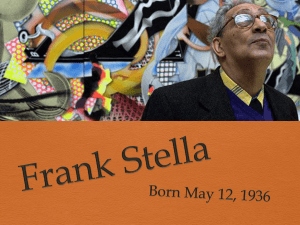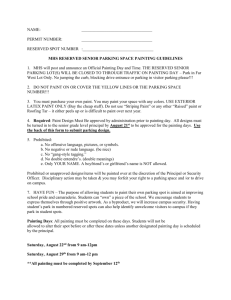“Magdalena Looking” by Susan Vreeland Late one afternoon when
advertisement
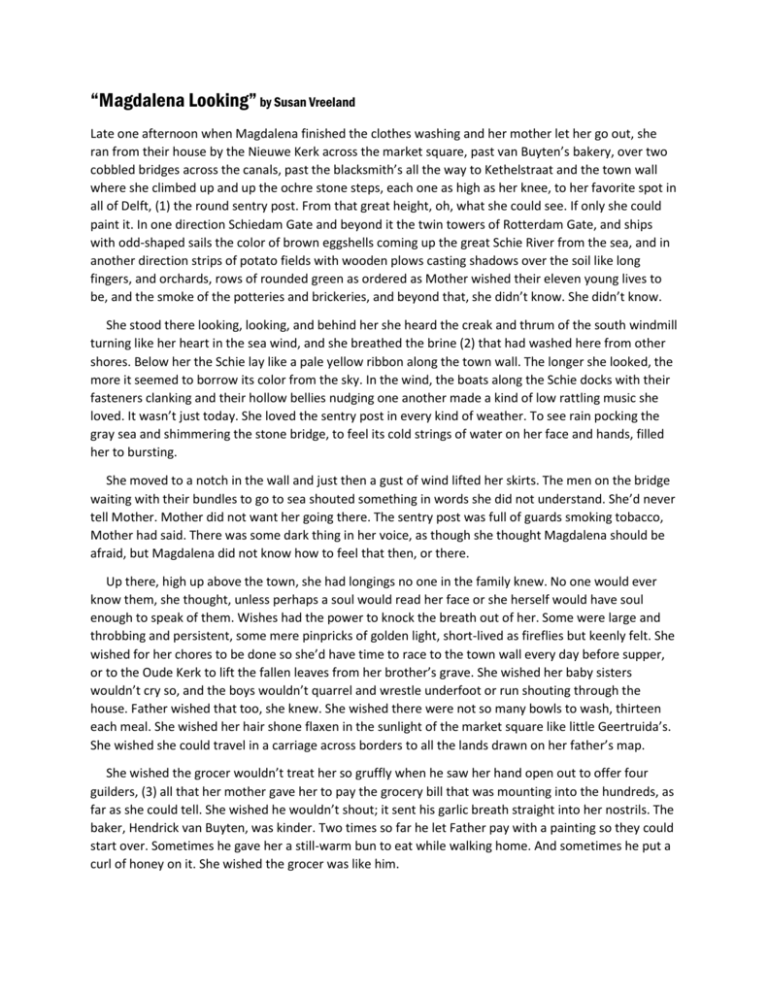
“Magdalena Looking” by Susan Vreeland Late one afternoon when Magdalena finished the clothes washing and her mother let her go out, she ran from their house by the Nieuwe Kerk across the market square, past van Buyten’s bakery, over two cobbled bridges across the canals, past the blacksmith’s all the way to Kethelstraat and the town wall where she climbed up and up the ochre stone steps, each one as high as her knee, to her favorite spot in all of Delft, (1) the round sentry post. From that great height, oh, what she could see. If only she could paint it. In one direction Schiedam Gate and beyond it the twin towers of Rotterdam Gate, and ships with odd-shaped sails the color of brown eggshells coming up the great Schie River from the sea, and in another direction strips of potato fields with wooden plows casting shadows over the soil like long fingers, and orchards, rows of rounded green as ordered as Mother wished their eleven young lives to be, and the smoke of the potteries and brickeries, and beyond that, she didn’t know. She didn’t know. She stood there looking, looking, and behind her she heard the creak and thrum of the south windmill turning like her heart in the sea wind, and she breathed the brine (2) that had washed here from other shores. Below her the Schie lay like a pale yellow ribbon along the town wall. The longer she looked, the more it seemed to borrow its color from the sky. In the wind, the boats along the Schie docks with their fasteners clanking and their hollow bellies nudging one another made a kind of low rattling music she loved. It wasn’t just today. She loved the sentry post in every kind of weather. To see rain pocking the gray sea and shimmering the stone bridge, to feel its cold strings of water on her face and hands, filled her to bursting. She moved to a notch in the wall and just then a gust of wind lifted her skirts. The men on the bridge waiting with their bundles to go to sea shouted something in words she did not understand. She’d never tell Mother. Mother did not want her going there. The sentry post was full of guards smoking tobacco, Mother had said. There was some dark thing in her voice, as though she thought Magdalena should be afraid, but Magdalena did not know how to feel that then, or there. Up there, high up above the town, she had longings no one in the family knew. No one would ever know them, she thought, unless perhaps a soul would read her face or she herself would have soul enough to speak of them. Wishes had the power to knock the breath out of her. Some were large and throbbing and persistent, some mere pinpricks of golden light, short-lived as fireflies but keenly felt. She wished for her chores to be done so she’d have time to race to the town wall every day before supper, or to the Oude Kerk to lift the fallen leaves from her brother’s grave. She wished her baby sisters wouldn’t cry so, and the boys wouldn’t quarrel and wrestle underfoot or run shouting through the house. Father wished that too, she knew. She wished there were not so many bowls to wash, thirteen each meal. She wished her hair shone flaxen in the sunlight of the market square like little Geertruida’s. She wished she could travel in a carriage across borders to all the lands drawn on her father’s map. She wished the grocer wouldn’t treat her so gruffly when he saw her hand open out to offer four guilders, (3) all that her mother gave her to pay the grocery bill that was mounting into the hundreds, as far as she could tell. She wished he wouldn’t shout; it sent his garlic breath straight into her nostrils. The baker, Hendrick van Buyten, was kinder. Two times so far he let Father pay with a painting so they could start over. Sometimes he gave her a still-warm bun to eat while walking home. And sometimes he put a curl of honey on it. She wished the grocer was like him. She wished Father would take the iceboat to the Schie more often. He’d bought a fine one with a tall ivory sail. “Eighty guilders,” Mother grumbled. “Better a winter’s worth of bread and meat.” On winter Sundays if the weather was clear, and if he was between paintings, it whisked them skimming across the white glass of the canal. She’d never known such speed. The sharp cold air blew life and hope and excitement into her ears and open mouth. She remembered wishing, one particular morning when Father mixed lead white with the smallest dot of lead-tin yellow (4) for the goose quill in a painting of Mother writing a letter, that she might someday have someone to write to, that she could write at the end of a letter full of love and news, “As ever, your loving Magdalena Elisabeth.” He painted Mother often, and Maria he painted once, draped her head in a golden mantle and her shoulders in a white satin shawl. She was older, fifteen, though only by eleven months. It might be fun to dress up like Maria did, and wear pearl earrings and have Father position her just so, but the only part she really wished for was that he would look and look and pay attention. More than all those wishes, she had one pulsing wish that outshone all the others. She wished to paint. Yes, me, she thought, leaning out over the stone wall. I want to paint. This and everything. The world from that vantage point stretched so grandly. Up there, beauty was more than color and shapes, but openness, light, the air itself, and because of that, it seemed untouchable. If only the act of wishing would make her able. Father only smiled queerly when she told him she wanted to paint, just as if she’d said she wanted to sail the seas, which, of course, she also wished, in order to paint what she would see. When she said so, that she wished to paint, Mother thrust into her hands the basket of mending to do. Often from the edge of the room, she’d watch him work. Because he was always asking for quiet, with the little ones running through the room laughing or shouting, she didn’t ask him many questions. He rarely answered anyway. Still, she studied how much linseed oil he used to thin the ultramarine, (5) and watched him apply it over a glassy layer of reddish brown. By magic, it made the dress he painted warmer than the blue on the palette. He would not let her go with him to the attic where he ground lead-tin yellow to powder, but he did send her to the apothecary (6) for the small bricks of it, and for linseed oil. Always there was money for that, but she didn’t know what to answer when the apothecary demanded the guilders for her brother’s potions still owed after he died. If only she could have colors of her own, and brushes. She wouldn’t just paint pictures of women inside cramped little rooms. She’d paint them out in marketplaces, bending in the potato fields, talking in doorways in the sunlight, in boats on the Schie, or praying in the Oude Kerk. Or she’d paint people skating, fathers teaching their children on the frozen Schie. Fathers teaching their children. The thought stopped her. Looking from the sentry tower at a cloud darkening the river, she knew, just as she knew she’d always have washing and mending to do, that it would not be so. She’d worn herself out with wishing, and turned to go. She had to be home to help with supper. On a spring day that began in no special way, except that she had climbed the town wall the afternoon before, and all over Delft lime trees lining the canals had burst into chartreuse (7) leaves, and light shone through them and made them yellower except where one leaf crossed over another and so was darker—on that spring-certain day, out of some unknown, unborn place came that scream. “I hate to mend,” she shouted to the walls, to Mother, to anyone. “It’s not making anything.” Father stepped into the room, looked at Mother and then scowled at Magdalena. It had been her job to keep her little brothers quiet for him, or shoo them out of doors, and here she was, the noisy one. No one moved. Even the boys were still. At first she looked only at Father’s hand smeared with ultramarine powder, not in his eyes, too surprised by the echo of her voice to fling out any additional defiance. She loved him, loved what he did with that hand, and even, she suspected, loved what he loved, though they had not spoken of it. When that thought lifted her face to his, she saw his cheeks grow softer, as if he noticed her in his house for the first time. He drew her over to the table by the window, brought the sewing basket, placed on her lap her brother’s shirt that needed buttons, adjusted the chair, opened the window, a little more, then less, and discovered that at a certain angle, it reflected her face. “If you sit here mending, I will paint you, Magdalena. But only if you stop that shouting.” He positioned her shoulders, and his hands resting a moment were warm through the muslin (8) of her smock and seemed to settle her. Mother rushed over to take away Geertruida’s glass of milk. “No, leave it, Catharina. Right there in the light.” For days she sat there, still as she could for Father, and yet sewing a few stitches every so often to satisfy Mother. In that mood of stillness, all the things within her line of vision touched her deeply. The tapestry laid across the table, the sewing basket, the same glass repoured each day to the same level, the amber-toned map of the world on the wall—it plucked a lute string in her heart that these things she’d touched, grown as familiar to her as her own skin, would be looked at, marveled at, maybe even loved by viewers of his painting. On sunny days the panes of window glass glistened before her. Like jewels melted into flat squares, she thought. Each one was slightly different in its pale transparent color—ivory, parchment, the lightest of wines and the palest of tulips. She wondered how glass was made, but she didn’t ask. It would disturb him. Outside the window the market chattered with the selling of apples and lard and brooms and wooden buckets. She liked the cheese porters in their flat-brimmed red hats and stark white clothes. Their curved yellow carrying platforms stacked neatly with cheese rounds were suspended on ropes between pairs of them, casting brown shadows on the paving stones. Two platforms diagonally placed in the midground between their carriers would make a nice composition with the repeated shapes of those bulging cheese rounds. She’d put a delivery boy wheeling his cart of silver cod in the background against the guild hall, and maybe in the foreground a couple of lavender gray pigeons pecking crumbs. The carillon (9) from Nieuwe Kerk ringing out the hour sounded something profound in her chest. All of it is ordinary to everyone but me, she thought. All that month she did not speak, the occasion too momentous to dislodge it with words. He said he’d paint her as long as she didn’t shout, and so she did not speak a word. Her chest ached like a dull wound when she realized that her silence did not cause him a moment’s reflection or curiosity. When she looked out the corner of her eye at him, she could not tell what she meant to him. Slowly, she came to understand that he looked at her with the same interest he gave to the glass of milk. Maybe it was because she wasn’t pretty like Maria. She knew her jaws protruded and her watery, pale eyes were too widely set. She had a mole on her forehead that she always tried to hide by tugging at her cap. What if no one would want the painting? What then? It might be her fault, because she wasn’t pretty. She wished he’d say something about her, but all he said, not to her directly, more to himself, was how the sunlight whitened her cap at the forehead, how the shadow at the nape of her neck reflected blue from her collar, or how the sienna of her skirt deepened to Venetian red (10) in the folds. It was never her, she cried to herself, only something surrounding her that she did not make or even contribute to knowingly. Another wish that never would come true, she saw then, even if she lived forever, was that he, that someone, would look at her not as an artistic study, but with love. If two people love the same thing, she reasoned, then they must love each other, at least a little, even if they never say it. Nevertheless, because he painted with such studied concentration, and because she held him in awe, she practiced looking calm for him as she looked out the window, but when she saw the canvas, what she intended as calm looked more like wistfulness. (11) The painting was not bought by the brewer, Pieter Claesz van Ruijven,who bought most of her father’s work. He saw it, but passed over it for another. Disgrace seared her so that she could not speak that night. The painting hung without a frame in the outer kitchen where the younger children slept. Eventually the family had to give up their lodgings at Mechelen on the square, and take smaller rooms with Grandmother Maria on the Oude Langendijck. (12) Her father stopped taking the iceboat out to the Schie, sold it, in fact. He rarely painted, the rooms were so cramped and dark, the younger children boisterous, and a few years later, he died. When she washed him in his bed that last time, his fingers already cold, she had a thought, the shame of which prevented her from uttering: It would make a fine painting, a memorial, the daughter with towel and blue-figured washing bowl at bedside, her hand covering his, the wife exhausted on the Spanish chair clutching a crucifix, the father-husband, eyes glazed, looking to another landscape. While he painted everyone else, no one was there to paint him, to make him remembered. She yearned to do it, but the task was too fearsome. She lacked the skill, and the one to teach her had never offered. Even though she asked for them, Mother sold his paints and brushes to the Guild of St. Luke. It helped to pay a debt. When Mother became sick with worry, Magdalena had the idea to take the painting to Hendrick van Buyten, the baker, because she knew he liked her. And he accepted it, along with one of a lady playing a guitar, for the debt of six hundred seventeen guilders, six stuivers, (13) more than two years’ worth of bread. He smiled at her and gave her a bun. Within a year, she married a saddlemaker named Nicolaes, the first man to notice her, a hard worker whose pores smelled of leather and grease, who taught her a pleasure not of the eyes, but, she soon realized, a man utterly without imagination. They moved to Amsterdam and she didn’t see the painting again for twenty years. In 1696, just after their only living child, Magritte, damp with fever, stopped breathing in her arms, Magdalena read in the Amsterdamsche Courant of a public auction of one hundred thirty-four paintings by various artists. “Several outstandingly artful paintings,” the notice said, “including twenty-one works most powerfully and splendidly painted by the late J. Vermeer of Delft, will be auctioned May 16, 1:00, at the Oude Heeren Logement.” Only a week away. She thought of Hendrick. Of course he couldn’t be expected to keep those paintings forever. Hers might be there. The possibility kept her awake nights. Entering the auction gallery, she was struck again by that keenest of childhood wishes—to make a record not only of what she saw, but how. The distance she’d come from that, and not even a child to show for it! She shocked herself by asking, involuntarily, what had been the point of having lived? Wishing had not been enough. Was it a mistake that she didn’t beg him to teach her? Maybe not. If she’d seen that eventually, with help, she could paint, it might have made the years of birthing and dying harder. But then the birthing and dying would have been painted and the pain given. It would have served a purpose. Would that have been enough—to tell a truth in art? She didn’t know. To see again so many of Father’s paintings was like walking down an avenue of her childhood. The honey-colored window, the Spanish chair, the map she’d stared at, dreaming, hanging on the wall, Grandmother Maria’s golden water pitcher, Mother’s pearls and yellow satin jacket—they commanded such a reverence for her now that she felt they all had souls. And suddenly there she was on canvas, framed. Her knees went weak. Hendrick hadn’t kept it. Even though he liked her, he hadn’t kept it. Almost a child she was, it seemed to her, gazing out the window instead of doing her mending, as if by the mere act of looking she could send her spirit out into the world. And those shoes! She had forgotten. How she loved the buckles, and thought they made her such a lady. Eventually she’d worn the soles right through, but now, brand-new, the buckles glinted on the canvas, each with a point of golden light. A bubble of joy surged upward right through her. No, she wasn’t beautiful, she owned, but there was a simplicity in her young face that she knew the years had eroded, a stilled longing in the forward lean of her body, a wishing in the intensity of her eyes. The painting showed she did not yet know that lives end abruptly, that much of living is repetition and separation, that buttons forever need resewing no matter how ferociously one works the thread, that nice things almost happen. Still a woman overcome with wishes, she wished Nicolaes would have come with her to see her in the days of her sentry post wonder when life and hope were new and full of possibility, but he had seen no reason to close up the shop on such a whim. She stood on tiptoe and didn’t breathe when her painting was announced. Her hand in her pocket closed tight around the twenty-four guilders, some of it borrowed from two neighbor women, some of it taken secretly from the box where Nicolaes kept money for leather supplies. It was all she could find, and she didn’t dare ask for more. He would have thought it foolish. “Twenty,” said a man in front of her. “Twenty-two,” said another. “Twenty-four,” she said so loud and fast the auctioneer was startled. Did he see something similar in her face? He didn’t call for another bid. The painting was hers! “Twenty-five.” Her heart cracked. The rest was a blur of sound. It finally went to a man who kept conferring with his wife, which she took as a good sign that it was going to a nice family. Forty-seven guilders. Most of the paintings sold for much more, but forty-seven was fine, she thought. In fact, it filled her momentarily with what she’d been taught was the sin of pride. Then she thought of Hendrick and a pain lashed through her. Fortyseven guilders minus the auctioneer’s fee didn’t come close to what her family had owed him. She followed the couple out into the drizzle of Herengracht, (14) wanting to make herself known to them, just to have a few words, but then dropped back. She had such bad teeth now, and they were people of means. The woman wore stockings. What would she say to them? She didn’t want them to think she wanted anything. She walked away slowly along a wet stone wall that shone iridescent, and the wetness of the street reflected back the blue of her best dress. Water spots appeared fast, turning the cerulean (15) to deep ultramarine, Father’s favorite blue. Light rain pricked the charcoal green canal water into delicate, dark lace, and she wondered if it had ever been painted just that way, or if the life of something as inconsequential as a water drop could be arrested and given to the world in a painting, or if the world would care. She thought of all the people in all the paintings she had seen that day, not just Father’s, in all the paintings of the world, in fact. Their eyes, the particular turn of a head, their loneliness or suffering or grief was borrowed by an artist to be seen by other people throughout the years who would never see them face to face. People who would be that close to her, she thought, a matter of a few arms’ lengths, looking, looking, and they would never know her.
